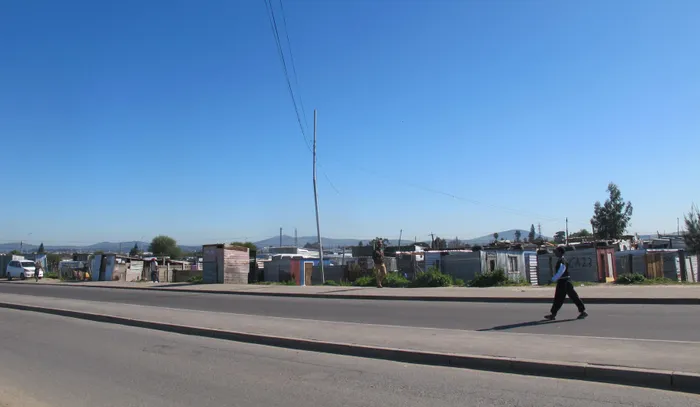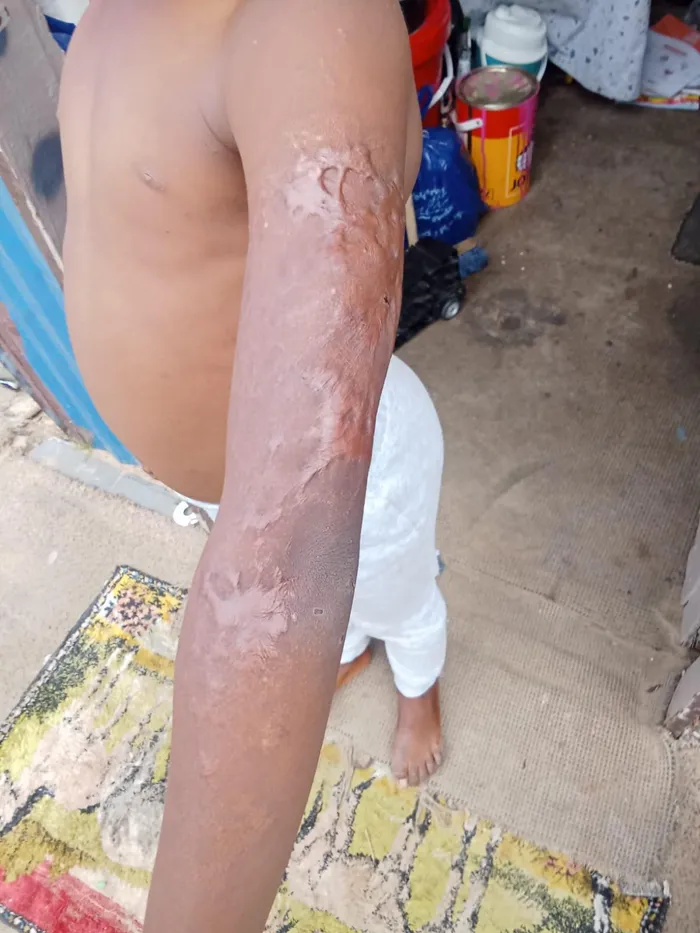Kraaifontein residents seek help as drinking water crisis deepens

A year-long lack of access to drinking water has compelled a Kraaifontein community to seek intervention from the South African Human Rights Commission.
Image: Sibulele Kasa
A year-long lack of access to drinking water has led a Kraaifontein community to seek intervention from the South African Human Rights Commission.
The Covid Informal Settlement in Bloekombos was established during lockdown in 2020 by residents who could not afford to rent properties or those seeking independence from their families. Still, they had to endure a lack of access to drinking water after the City of Cape Town’s water tanker was stopped around June last year.
The area was surveyed in 2023, and the total number of structures was recorded as more than 7,550, according to the City’s Human Settlements Directorate.
Residents gave an account of the consequences of living without water, which included a child who was burnt in a shack fire, residents who are struggling to drink their medication, poor sanitation for the elderly, and conflict with residents in the neighbouring Wallacedene area.
Nokwanda Thwesha, 45, mother of two children, said her seven-year-old daughter, Iminathi, was burnt when her shack went up in flames in November last year, while she went to wait in the queue for tap water in Wallacedene.
“After walking a long distance, we will then wait in the queue to get water from the tap. When we came some hours later, we found the shack burning and the children were sleeping inside. My son managed to escape unharmed, but my daughter was burned,” she said.
She said that although the burn wounds have healed, the girl sometimes complains of pain when exposed to intense sunlight. She added that another shack was also affected by the fire.
Mandisa Mntuyedwa said it worries her when she is away because her 80-year-old mother, who walks with a stick, suffers from a painful leg.
“I am not working, I am trying to make a living as a hawker, but trading is not reliable; today you make a profit, and then tomorrow you don't.”
Ms. Mntuyedwa said she buys 20 litres of water for R10 from people who go running, pushing trolleys, and selling water, as her mother needs help.
“If I could not buy water because I was busy at the stall, there would not be water for that day. I need to have water all the time because she uses a bucket to help herself. Then I will throw what is in that bucket away and clean it. That bucket needs to have water all the time for our health and fresh air,” she said.
The "unprecedented large-scale" unlawful occupations during Covid-19 and the national lockdown created 186 new informal settlements – bringing the total number of informal settlements to 683 settlements in Cape Town, said Carl Pophaim, mayoral committee member for human settlements.
An activist in the Covid settlement, Thabo Kolwana, said some of the challenges posed by the lack of water were that people cannot wash their hands after using the restroom, some cannot drink their medication, and the community cannot deal with a fire should it break out.
There are 60 concrete-slab toilets there, which were installed in the last financial year, according to the City's Mayco member for water and sanitation, Zahid Badroodien.
Another resident, Lindelwa Mavata, said queuing for water in Wallacedene often led to conflict, as residents wanted to fill their buckets while residents from the Covid settlement formed long queues, causing tension.
She said the taps were later closed, and Wallacedene locals decided to install taps inside their houses, which left residents of the Covid settlement without an option.
“The taps would be damaged sometimes in Wallacedene. They would ask us to buy the taps too, and we used to do that, but now they have closed them,” Ms Mavata said.
Dr Badroodien said the City was also aware that there are residents who have illegally connected water pipes to their infrastructure, “which will need to be investigated.”
He said that water tanker deliveries were halted around mid-year last year after residents stopped collecting water from the distribution point.
For a long-term solution, a study will be conducted to assess the possibility of installing standpipes in the area, he told Northern News.
"The informal settlement is located on critical stormwater infrastructure and, as such, providing formalised services will require the necessary environmental approvals. The City discourages unauthorised erection of structures, especially where bulk service infrastructure is not in place and other infrastructure is being compromised."
Ward 101 councillor Siyabonga Duka confirmed the presence of illegal water connections and added that some committee and community members were rejecting the use of the water tanker.
“There are committees that rejected that tanker. I bring it back, and then some committees and some residents will decline it and complain that the water is dirty. Those who chased it away are no longer around; we don’t see them,” he said.
Linda Phito, another community activist, said the reason people connected to the infrastructure illegally was an indication that they desperately needed the water.
He requested intervention from the South African Human Rights Commission on Friday, July 4, and the complaint is currently under investigation.
“Access to water is central to the well-being of all human beings. Due to the significance of this right and the impact which not having access to water has on the enjoyment of other rights, including, but not limited to, the right to life and dignity, the Commission prioritises attendance to complaints of this nature,” said Ms Zena Nair, the provincial manager of the commission.
Mayoral Committee Member for Human Settlements, Carl Pophaim, said more than 60% of informal settlements in Cape Town are considered high risk – situated under power lines, in wetlands, retention ponds, dams, low-lying inappropriate land, and biodiversity protected areas.
He said there is a need for about 500 ha of land to be allocated for these new occupants.
Approximately 400 000 applicants have registered their need for housing on the City’s Housing Needs Register and are still awaiting housing opportunities.

How seven-year-old Iminathi Thwesha look now, after she burnt when shack fire went up in flames in November last year.
Image: Supplied.